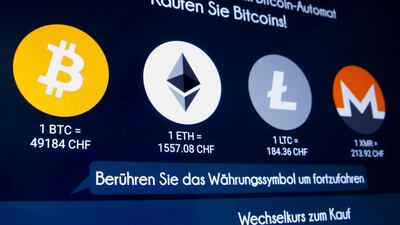Bitcoin is changing the world. But in a year of staggering statistics for the technology, there is one of which the currency's elusive creator – their identity remains unknown – should be less proud.
New research suggests that it is, quite literally, changing the world. Academics at Cambridge University estimate that the currency's electricity consumption is 119.87 Terawatt-hours per year. This is more than the UAE's annual consumption and fast approaching Pakistan's, a country with the fifth largest population globally. Its addition to global energy consumption is essentially equivalent to a new superpower being magicked out of nothing.
Bitcoin has humble origins. Its subsequent achievements have been anything but. The currency's value has risen by over 400 per cent in the past year. It recently hit an all-time high of $64,869. In February, Tesla's CEO Elon Musk made headlines when he announced that his company had bought $1.5 billion worth of it, despite it being one of the most volatile currencies in existence. His company will also start accepting bitcoin as a payment method. Other companies have started doing the same.
Its success is attracting the attention of governments. As The National reported last week, Britain's finance minister Rishi Sunak has instructed the Bank of England to consider the possibility of launching a central bank-backed "Britcoin". The technology could even have a role in the humanitarian sector. Portuguese academics have argued that its blockchain technology could help refugees get treatment and access health records in migrant camps.
But innovation and progress must not blind users to its vast environmental shortcomings. For the almost cult-like following that bitcoin has garnered in recent years, cryptocurrency is the future.
Environmentally, however, it is regressive. Wealth cannot be created out of thin air. The tendency to believe that moving online necessarily reduces our energy consumption is wrong. No matter how virtual our lives might feel today, none of it would be possible without vast and energy-intensive servers, battery technologies and hardware. Entirely digital, bitcoin is thousands of times more energy-intensive than credit card transactions. Iran has even said that the strain of processing cryptocurrency transactions contributed to a series of power outages in Tehran earlier this year.
Countries around the world are committed more than ever to saving the environment. They are demonstrating willingness to alter their industrial sectors, society and economies to meet tough climate targets, internationally agreed benchmarks that hold states to account. Bitcoin is not a country and has no regulating authority. That is a central part of its appeal. But it is not an excuse for unacceptable energy costs. If the currency's worldwide network of enthusiasts want to present it as an alternative way of doing business, they have to prove it can do so without bankrupting the environment.



